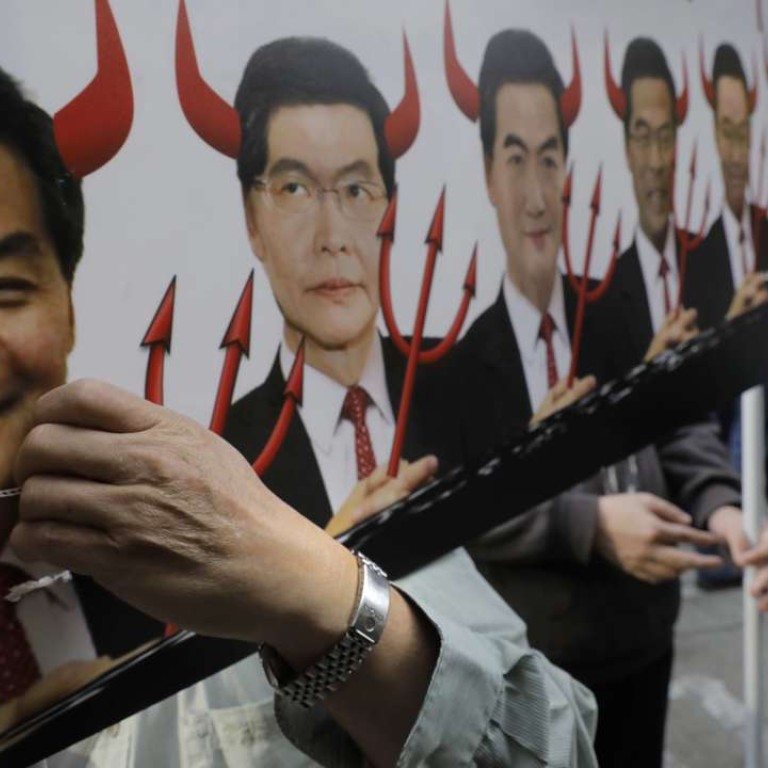
With no favourite in the Hong Kong leadership race, Beijing should bet on the people to pick a winner
Alice Wu says the central government’s apparent dilemma over the lack of a safe bet in the chief executive election has an easy solution – just let the people choose, a win-win plan for both sides
Time is passing quickly, and a horse race is coming up that officials seem to be struggling to kick-start. Those who can place bets – the Election Committee – are ready, but where are all the horses? We know a new chief executive will be taking the reins come July 1, but who?
Whatever happened to Deng Xiaoping’s ( 鄧小平 ) famous observation that the horse racing and dancing would carry on? We have a race day. The course is set. We have two candidates but, for weeks, we have been waiting for the two supposed “front runners” to make an announcement.
This will be this city’s sixth chief executive horse race. But this time around, the punters – whether they are betting for or against Beijing – are still casting about for a game plan, given Beijing’s silence.
The central government can delay approving the resignations of local officials and can, therefore, keep horses otherwise eager to get to the starting gate in their stables.
Three major policy initiatives to watch if John Tsang becomes the next chief executive
Watch: What body language reveals about our politicians
It has been almost 20 years since the handover. We want to get on with the horse racing and dancing
That has to be the cruellest way of rubbing salt in the wounds of the disenfranchised. We can’t bet on the race, and now we can’t even watch it?
So what’s the big fuss? Apparently, sources say Beijing is worried that none of the potential candidates can win by a comfortable margin of, say, 700 of the 1,194 Election Committee votes. At this point, none seems able to carry more than 601 votes, making the outgoing chief executive’s 689-vote mandate look good.
Perhaps that is Beijing’s parting gift for Leung Chun-ying. Nothing quite “affirms and supports” the work of Leung and his administration more than worrying about his successor not being able to secure more than 601 votes.
Beijing not ready to show its hand on Hong Kong chief executive preference, top official hints

Low expectations may be the key to a happy 2017
As Beijing mulls over its political calculus for Hong Kong, it should think about the term limits – two terms of five years each – set on the office of the chief executive. More specifically, the central government really needs to consider that no Hong Kong chief executive has served two full terms. I may be shooting in the dark here, but I think that says something about Hong Kong people’s discomfort over a predestined race, that we have been cut out of the decision-making process.
If Beijing is hoping to find a candidate who can secure broader support, then perhaps it should consult the people. People have put forward names of those they believe have the respect not just of the pro-establishment camp, but also the pan-democrats.
Universal suffrage back in focus for Hong Kong New Year march
So, instead of calculating existing potential candidates’ votes, Beijing should consider someone who has the best chance of putting political reform back on the table. It must have been frustrating for Beijing to see the local reaction to its Palace Museum gift for the West Kowloon Cultural District, but it was an indicator of how frustrated the people are. Without a chief executive elected by universal suffrage, the “601” challenge will remain Beijing’s perpetual problem and any “gift” will be seen as suspect. Beijing will continue to be forced into the role of being pitted against the people.
It has been almost 20 years since the handover. We want to get on with the horse racing and dancing. It’s time we had the chance to be responsible for our own choice for chief executive, whether he or she succeeds or fails. We get to bet and, in return, we bear the consequences. This will be a win-win situation for Hong Kong and Beijing.
Alice Wu is a political consultant and a former associate director of the Asia Pacific Media Network at UCLA

